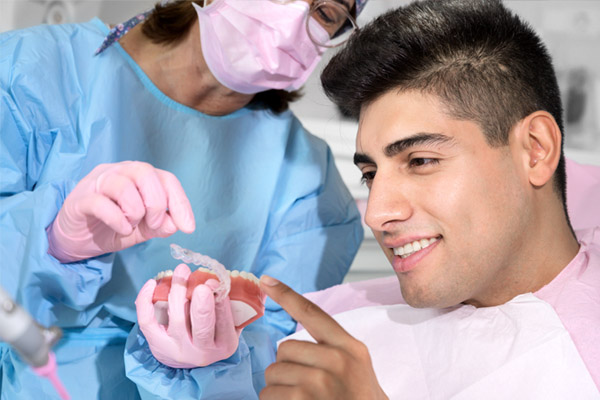Improve Your Oral Health with Implant Supported Dentures

Dental patients with multiple missing teeth can benefit from implant supported dentures to restore their smiles and facilitate chewing. This state-of-the-art teeth replacement treatment is also highly effective for improving oral health.
What are implant supported dentures?
This popular teeth replacement option combines the support, stability, and comfort of implants with the affordability of traditional dentures. In addition, patients may benefit from prosthetic teeth that stay in place and do not interfere with speech, a common complaint among conventional denture wearers.
Dentures with implant support attach to up to six titanium posts that a dentist surgically secures to the jawbone. As with other dental implants, posts require up to six months to sufficiently fuse with the jawbone to ensure a stable base onto which the dentist can attach the dentures. Implants also facilitate the placement of non-removable denture options, thereby eliminating many significant disadvantages of conventional dentures.
How do implant supported dentures promote oral health?
Although removable dentures can restore function and appearance, there are downsides to this popular tooth restoration option. For example, removable dentures require adhesives to stay in place and can slip out of position, causing inconvenience or embarrassment. Permanent implant supported dentures eliminate these problems and reduce the risk of oral infection.
Prevent jawbone loss
The roots of natural teeth attach to the jaw bone, which receives constant stimulation through chewing and biting. This stimulation promotes the regeneration of bone necessary to secure the teeth in place. However, without the presence of teeth and their roots, bone absorbs into the surrounding tissue. Implants replace missing roots and encourage the stimulation that replenishes the bone.
Prevent gum sores
Many denture wearers experience mouth ulcers when poorly-fitting dentures rub against the delicate gum and cheek tissues. Improper maintenance can also damage dentures and promote sores by changing how they fit in the mouth. Patients who neglect to remove conventional dentures while sleeping also develop friction sores. Once sores form, the risk for oral bacterial infections increases significantly.
Permanent dentures with implant supports do not shift during eating, cleaning, and speaking and can remain in place while sleeping; therefore, patients avoid sores and infections.
Prevent shifting of natural teeth
Securing dentures with implants prevents teeth from shifting to fill spaces along the gum line. When gaps exist in the mouth, other teeth begin to move. This can result in changes to how the upper and lower teeth connect. These bite changes compromise patients' ability to chew correctly and may create tight spaces between teeth that can trap food. As a result, practicing adequate home care becomes challenging, and many conventional denture wearers begin to experience cavities and gum infections.
Implants that permanently secure dentures can improve oral hygiene practices by preventing the shifting of natural teeth and the creation of unreachable spaces that can accumulate plaque and tartar.
More durable
Removable dentures traditionally consist of acrylic that can warp and bend over time under normal chewing pressure. A denture that loses shape can quickly interfere with a patient's bite. As a result, food and bacteria can cling to parts of the denture that come in contact with the underlying gum and surrounding natural teeth, promoting decay and infection.
By contrast, titanium posts that support dentures resist warping and do not include parts that envelope the underlying gum; therefore, the risk for bacterial infections is far lower than what it may be with conventional acrylic options.
Easier to clean
Removable dentures consist of porous acrylic with crevices that sit over the natural gums like a glove. Routine brushing cannot sufficiently clean the material, which does not respond to the body's germ-fighting immune system. Therefore, conventional dentures can breed bacteria colonies that spread throughout the mouth unless patients soak them in a cleaning solution every day. The infection risk is higher for patients with dry mouth. Insufficient saliva production due to illness or medication side effects may inhibit the mouth's natural self-cleaning function, leading to potential issues with teeth and gums.
Titanium posts that support permanent dentures are biocompatible, fuse with the body's natural tissues, resist warping, and can support acrylic, porcelain, or zirconia prosthetics. Although acrylic dentures still attract bacteria, implant-supporting dentures lead to fewer bacterial infections than conventional acrylic options. Also, implants work well with non-porous porcelain and zirconia denture options. However, all dentures involving implants require wearers to practice good oral hygiene using a soft toothbrush, dental floss, and water flosser.
Conclusion
Recent advances in modern dentistry provide more options for treating tooth loss than ever before. Patients can rely on a knowledgeable dentist for help choosing permanent implant supported dentures to achieve a beautiful, functional, and healthy mouth.
Request an appointment here: https://www.carolinasmilesdentist.com or call Carolina Smiles Family Dental at (828) 974-3326 for an appointment in our Brevard office.
Check out what others are saying about our dental services on Yelp: Implant Supported Dentures in Brevard, NC.
Recent Posts
Tooth loss can hurt one’s smile as well as the ability to eat or speak. With implant-supported dentures, the entire look of the smile can be transformed, and individuals can enjoy more freedom with food choices. These dentures are long-lasting and have a positive impact on oral and emotional health.Dentures are a dental tool for…
Implant supported dentures are an alternative form of dentures. Dentures are prosthetic devices constructed to replace missing teeth. When patients lose their teeth through decay, injury, or gum disease, dentures restore their smile and ability to chew, and prevent premature aging from lost teeth. Implant-supported dentures are in between adhesive dentures and full-arch dental implants.…
Implant supported dentures are dentures that are held in place by implants. They are an effective option for replacing missing teeth. Dental implants are very popular because of their high success rate and advantages. Anyone considering implant supported denturessshould take time to learn about the procedure. This includes the recovery process. After the procedure, it…
You have probably heard about implants and the different ways this treatment can help your oral health. Dentures are another common method for replacing teeth. Your dentist may suggest combining the two by using implant-supported dentures to preserve the function of your mouth. This apparatus provides stability and strength that other options cannot match.A person’s…


